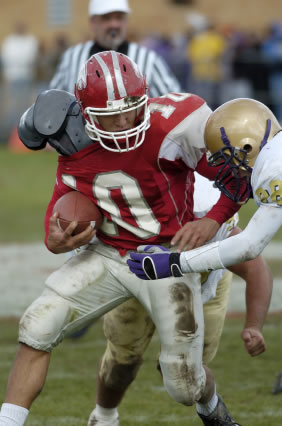
Image: iStockphoto
Too many athletes may be going back onto the field, court or rink too soon after a concussion, according to a new study that recommends athletes undergo post-exertion neurocognitive testing before being cleared to return to play.
Three UPMC clinicians and researchers were co-authors of a study published in the January edition of Brain Injury showing that cognitive concussion issues may linger undetected in athletes at rest. That’s what the Boston-based study, by lead investigator Neal McGrath, Ph.D., and Wayne Dinn, Ph.D., of Sports Concussion New England, found in more than one in four high-school age athletes. They reported being symptom-free and returned to baseline neurocognitive-test levels, meaning most clinicians and state laws would allow them to return to their sports. Yet, in spite of feeling ready to return, 27.7 percent of these athletes displayed at least one area of cognitive decline after moderate physical exertion.
Those players were then kept from contact sports, allowed more time to heal and ultimately passed post-exertion cognitive testing before being cleared to return to play. Thus, the researchers concluded that computerized neurocognitive testing following moderate exertion should be part of the standard procedure when making return-to-play decisions for athletes for whom activity or exercise shows that they remain cognitively impaired.
“For years now, it has been widely understood that no contact-sports athlete should return to play until all signs point to a full recovery,” McGrath said. “We have also known that computerized neurocognitive testing can show lingering cognitive deficits even when recovering athletes feel symptom-free. It has been standard practice to progress symptom-free athletes back through increasing physical activity over a few days while checking for a recurrence of symptoms. These findings suggest that post-exertion neurocognitive testing may be an important way to help verify that recovering athletes are ready to sustain hits again in football, hockey, soccer and other contact sports.”
“We feel the issue is less related to heart rate and more related to the vestibular system, which is responsible for helping us to navigate our environment—space, motion, movement, balance,” said Michael “Micky” Collins, Ph.D., executive and clinical director of the UPMC Sports Medicine Concussion Program and a participating investigator in the study. “The role and importance of exertion in recovery from concussion is ubiquitous; that’s why we have a full-time exertional physical therapists in our program. This study looked at physical exertion. But I think in future studies we need to look at return-to-school and cognitive function back in the classroom as well.”
From a pool of more than 800 concussion cases reviewed over a two-year period, 54 contact-sports athletes from 15 high schools and a junior-hockey team met the criteria for the study, which used their scores from the Immediate Post-Concussion Assessment and Cognitive Testing (ImPACT) and clinical examinations by an attending sports-medicine professional. McGrath, a clinical neuropsychologist, also independently confirmed the findings of a concussion in each athlete. When the players exhibited no more symptoms and their neurocognitive scores returned to baseline levels—determinants used by most clinicians and state laws in permitting athletes to return to play—participants were put through moderate exercise for approximately 15 to 25 minutes on a treadmill, elliptical or stationary bicycle. After a brief rest period, they completed neurocognitive testing again.
Fifteen of those athletes (the aforementioned 27.7 percent) displayed cognitive deficiencies that would categorize them as still injured with a concussion and therefore unfit to return to play. In particular, these athletes scored significantly lower in the verbal and visual memory portions of the neurocognitive testing. However, processing speed and reaction scores did not worsen following exertion.
“This suggests that tests focusing primarily on reaction time or processing speed may not be as effective at detecting post-exertion impairment,” said Anthony Kontos, Ph.D., assistant research director of the UPMC Sports Medicine Concussion Program. “As such, a comprehensive test that includes verbal and visual memory in addition to these other tests should be used by clinicians.”
“Moving forward, we plan additional research involving a larger sample that includes more girls,” Kontos added, citing this study’s small number of female participants (11 of the 54). “We also plan to examine the effects of different levels of exertion on cognitive performance.”
